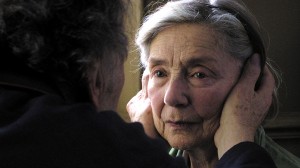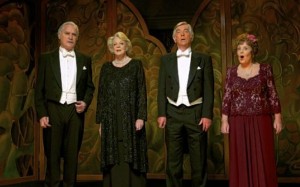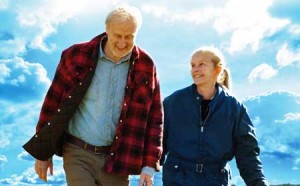Guest Post: Tara Sonenshine on Movie Portrayals of Aging
Posted on August 3, 2013 at 8:00 am
Many thanks to Tara D. Sonenshine for allowing me to post this guest commentary about the portrayal of aging in recent film:
Movies come in thematic waves. Recently I’ve noticed many new releases about—well, getting old. Aging actors playing aging characters. Are baby boomers running Hollywood and desperate to remind us we were born many moons ago?
But there’s a twist in these aging sagas: most of the main characters are old men playing male caregivers taking care of aging wives. That’s a switch! The men live longer.
 From “Amour” to “Unfinished Song,” from “Quartet” to “Still Mine,” the plots are about the sunset years…which turn out not all that golden. The Motion Picture Association of America might need a new disclaimer: BEWARE: These movies contain scenes of physical and mental deterioration related to the aging process.”
From “Amour” to “Unfinished Song,” from “Quartet” to “Still Mine,” the plots are about the sunset years…which turn out not all that golden. The Motion Picture Association of America might need a new disclaimer: BEWARE: These movies contain scenes of physical and mental deterioration related to the aging process.”
What happened to “aging gracefully?” Aren’t we supposed to be living “longer and stronger?”
Not according to Hollywood.
In “Amour” Austrian director Michael Haneke insists we have few, if any, light moments. Anne, a retired music teacher, endures a stroke early in the film and for two hours we watch, literally watch, as Anne grows frail and incapacitated. We move with her into a wheelchair. Her husband is nothing short of heroic in trying to take care of her, but he ages, not very well, throughout the process of coping with end-of-life grief. Relief comes only in imagining heaven as an upbeat alternative.
Vanessa Redgrave is stunning in “Unfinished Song” as Marion, who is dying from cancer and has only a few months to live. Although it is not a very cheerful premise, Marion’s attitude towards life and music and her fierce dedication to sing with an elderly chorus, makes this a kind of second-chance film. But even though the movie has its uplifting moments and happy songs, the fact remains that Vanessa Redgrave weakens and dies. Her husband, Arthur, played superbly by Terence Stamp, is the classic grumpy old man, who only lightens up in the last fifteen minutes of the film—too late, really, to enjoy the rest of his marriage to Marion.
 The most upbeat of these aging films is “Quartet” which takes place in a British retirement home for musicians. There are funny moments of elder romance and old love affairs to distract you from the fundamental reality that some of these residents don’t really want to be living in a group home but have little choice. But after seeing life in “Beecham House,” the British retirement home in the movie, it sure beats aging at home.
The most upbeat of these aging films is “Quartet” which takes place in a British retirement home for musicians. There are funny moments of elder romance and old love affairs to distract you from the fundamental reality that some of these residents don’t really want to be living in a group home but have little choice. But after seeing life in “Beecham House,” the British retirement home in the movie, it sure beats aging at home.
As for powerful and poignant, I’d pick “Still Mine,” a Canadian film starring James Cromwell as the 87-year old Craig Morrison, desperate to build a new house for his aging wife who is losing her memory. Genevieve Bujold is brilliant as Irene Morrison, Craig’s wife of 61 years, but you have to endure her steady decline to the point of losing her way, falling, and breaking a hip. The best line of the film is “age is an abstraction, not a straight jacket.” Great — unless you happen to be getting old.
 Film critics and historians will rightly point out that growing old is not a new theme. Shakespeare’s Lady Macbeth goes downhill in the 1600s over the course of the play. At one point her Elizabethan doctor says that Lady Macbeth is “with thick coming fancies”—resembling modern day Alzheimer’s. (Shakespeare kills off Lady Macbeth with a romantic twist as she begs to be “unsexed.”) Similarly, in “King Lear” we meet an old man faced with regrets and resentment at how his daughters turned out. He begins to decline early in the play. By the end, Lear is self-described as “a very foolish old man” whose mental prowess is fading—by his own account “not in my perfect mind.”
Film critics and historians will rightly point out that growing old is not a new theme. Shakespeare’s Lady Macbeth goes downhill in the 1600s over the course of the play. At one point her Elizabethan doctor says that Lady Macbeth is “with thick coming fancies”—resembling modern day Alzheimer’s. (Shakespeare kills off Lady Macbeth with a romantic twist as she begs to be “unsexed.”) Similarly, in “King Lear” we meet an old man faced with regrets and resentment at how his daughters turned out. He begins to decline early in the play. By the end, Lear is self-described as “a very foolish old man” whose mental prowess is fading—by his own account “not in my perfect mind.”
Growing old can be productive. In the Book of Genesis, Sarah does it—pretty well, bearing a child in her eighties and proving that with age comes wisdom. We all want to look like we imagine Sarah looked in the Bible. Good.
Perhaps the answer lies in the movie ratings. “G” sounds good to me. “Gleeful” and “glad” to be part of a generation that thinks “strokes” are for tennis games or golf courses.
In the end, given the choice, I’d pick youth over aging. But if old age is the only option, there are plenty of good lessons to be learned—at the movies.
Tara D. Sonenshine is former Under Secretary of State for Public Diplomacy and Public Affairs. She is an avid moviegoer.
